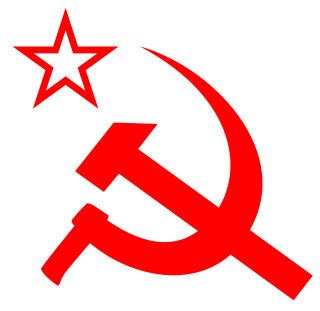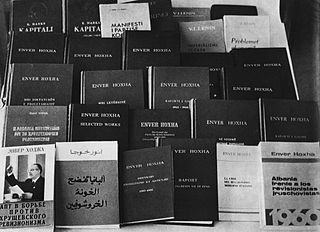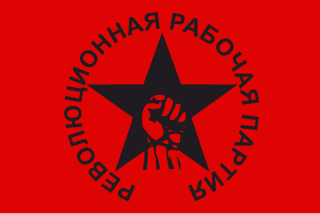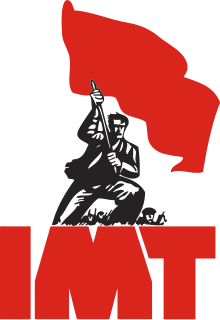
Trotskyism is the political ideology and branch of Marxism developed by Ukrainian-Russian revolutionary Leon Trotsky and by some other members of the Left Opposition and Fourth International. Trotsky self-identified as an orthodox Marxist, a revolutionary Marxist, and Bolshevik–Leninist, a follower of Marx, Engels, and of 3L: Vladimir Lenin, Karl Liebknecht, Rosa Luxemburg. He supported founding a vanguard party of the proletariat, proletarian internationalism, and a dictatorship of the proletariat based on working class self-emancipation and mass democracy. Trotskyists are critical of Stalinism as they oppose Joseph Stalin's theory of socialism in one country in favor of Trotsky's theory of permanent revolution. Trotskyists also criticize the bureaucracy and anti-democratic current that developed in the Soviet Union under Stalin.

Socialist Appeal is the newspaper of the British section of the International Marxist Tendency, and also the name used by a group of members and supporters of the Labour Party who organise around the paper.

The Democratic Socialist Perspective (DSP) was an Australian Marxist political group, which operated as the largest component of a broad-left socialist formation, the Socialist Alliance. In 2010, the DSP voted to merge into the Socialist Alliance.

Socialist Alternative (SA) is a Trotskyist organisation in Australia. As a revolutionary socialist group, it describes itself as aiming to organise collective struggles against oppression and inequality, while promoting the need for a revolutionary movement that could one day overthrow capitalism. Its members have been involved in organising numerous protest campaigns around issues such as LGBT rights, climate change, racism and refugee rights. The organisation also intervenes into the trade union and student union movements. It has branches and student clubs in most major Australian cities, and publishes the fortnightly newspaper Red Flag.
The Irish Workers' Group (IWG) was a Marxist political party in Ireland. It originated as the Irish Workers Union, which later called itself the Irish Communist Group, and contained a variety of people who all considered themselves to be Marxists. Some were from an Irish Republican background, and some, including Gerry Lawless, also became involved in Saor Éire.
The League for Socialist Action was a small Trotskyist organisation in Britain.

The Communist Party of Turkey/Marxist–Leninist is a Maoist insurgent organization in Turkey involved in the Maoist military strategy of people's war against the Turkish government. It was founded in 1972 by a group of former members of the Revolutionary Workers and Peasants Party of Turkey (RWPPT), organised by İbrahim Kaypakkaya as TKP (M-L), who wished to carry out armed struggle.
Union of Russian Social-Democrats Abroad was an organization of emigrant Russian socialists, set up in Geneva in 1894 on the initiative of the Emancipation of Labour group. It had its own printing press for issuing revolutionary literature, and published the newspapers Rabotnik and Listok Rabotnika. Initially, the Emancipation of Labour group directed the Union and edited its publications. But afterwards opportunist elements gained the upper hand within the Union.
The International Marxist Group (IMG) was a Trotskyist group in Britain between 1968 and 1982. It was the British Section of the Fourth International. It had around 1,000 members and supporters in the late 1970s. In 1980, it had 682 members; by 1982, when it changed its name to the Socialist League, membership had fallen to 534.

Left communism, or the communist left, is a position held by the left wing of communism, which criticises the political ideas and practices espoused by Marxist–Leninists and social democrats. Left communists assert positions which they regard as more authentically Marxist than the views of Marxism–Leninism espoused by the Communist International after its Bolshevization by Joseph Stalin and during its second congress.

Hoxhaism is a variant of anti-revisionist Marxism–Leninism that developed in the late 1970s due to a split in the anti-revision movement, appearing after the ideological dispute between the Communist Party of China and the Party of Labour of Albania in 1978. The ideology is named after Enver Hoxha, a notable Albanian communist leader, who served as the First Secretary of the Party of Labour.

The Revolutionary Workers' Party is a Russian Trotskyist organisation established in 1999. From 2002 to 2011 there were two active organisations called the 'Revolutionary Workers' Party'. In April 2011, activists from one of the two, centred in Perm, merged their organisation into the Russian Socialist Movement. In May 2019 part of the RWP split and merged into the International Marxist Tendency, naming themselves Marxist Tendency.
The Alliance for Workers' Liberty (AWL), also known as Workers' Liberty, is a Trotskyist group in Britain and Australia, which has been identified with the theorist Sean Matgamna throughout its history. It publishes the newspaper Solidarity.

The International Workingmen's Association (IWA), often called the First International (1864–1876), was an international organisation which aimed at uniting a variety of different left-wing socialist, communist and anarchist groups and trade unions that were based on the working class and class struggle. It was founded in 1864 in a workmen's meeting held in St. Martin's Hall, London. Its first congress was held in 1866 in Geneva.

The International Marxist Tendency (IMT) is an international Trotskyist political tendency founded by Ted Grant and his supporters following their break with the Committee for a Workers' International in 1992. The organization's website, Marxist.com, is edited by Alan Woods. The site is multilingual, and publishes international current affairs articles written from a Marxist perspective, as well as many historical and theoretical articles. The IMT is active in over 40 countries worldwide.
The International Conference of Marxist–Leninist Parties and Organizations (ICMLPO) was an international grouping of political parties and organizations adhering to Mao Zedong Thought founded in 1998 by the Marxist-Leninist Party of Germany. It was organized by a Joint Coordination Group and met every two or three years. It ceased to exist in 2017.

Edward Grant was a South African Trotskyist who spent most of his adult life in Britain. He was a founding member of the group Militant and later Socialist Appeal.

The International Socialist Tendency (IST) is an international grouping of unorthodox Trotskyist organisations espousing the ideas of Tony Cliff (1917–2000), founder of the Socialist Workers Party (SWP) in Britain. It has sections across 27 countries; however, its strongest presence is in Europe, especially in Britain.











